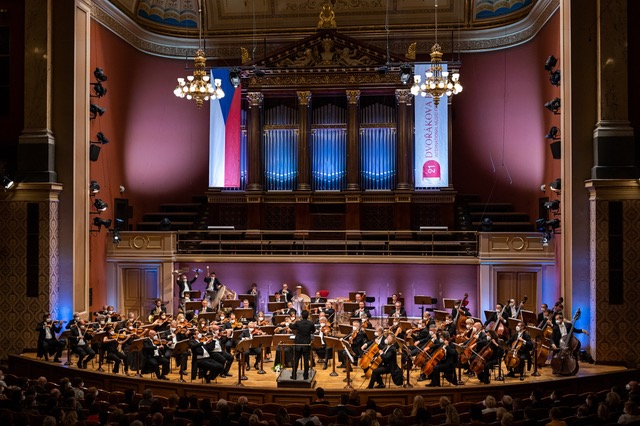
 Czech Republic Dvořák Prague International Music Festival: Daniel Müller-Schott (cello), Julian Rachlin (violin), Filarmonica della Scala / Andrés Orozco-Estrada (conductor). Rudolfinum, Prague, 6-7.9.2021. (RP)
Czech Republic Dvořák Prague International Music Festival: Daniel Müller-Schott (cello), Julian Rachlin (violin), Filarmonica della Scala / Andrés Orozco-Estrada (conductor). Rudolfinum, Prague, 6-7.9.2021. (RP)

Program 1: 6.9.2021
Dvořák – Concerto for Cello and Orchestra in B minor Op.104; Symphony No.9 in E minor Op.95, ‘From the New World’
Program 2: 7.9.2021
Weber – Der Freischütz, Overture
Mozart – Concerto for Violin and Orchestra No.3 in G major K.216
Brahms – Symphony No.2 in D major Op.73
The Dvořák Prague International Music Festival is decidedly Czech in spirit but unquestionably international in scope and ambition. Founded in 2008, the festival is the successor to the Prague Autumn International Music Festival which began in 1991 in the wake of the Velvet Revolution, the peaceful transition of power in 1989 from one-party rule by the Communist Party in the former Czechoslovakia.
The festival’s focus is on Czech music and musicians, but it offers concerts by leading international ensembles and soloists in programs that reach far beyond the music of Czech composers. Even in the midst of the pandemic last year, the festival took place and offered 24 live concerts in September 2020; most of the participating musicians were Czech due to travel restrictions. For the 2021 festival, it is a return to business as usual with concerts performed in the Rudolfinum before live audiences.
Andrés Orozco-Estrada and the Filarmonica della Scala opened the festival with an all Dvořák program. It was a gala event, and the concert was broadcast live on Czech television. Filarmonica della Scala was established by Claudio Abbado and the musicians of La Scala in 1982 with the objective of developing a symphonic repertoire in order to add another dimension to the company’s great operatic tradition. Since 2015, Riccardo Chailly has been its principal conductor.
The Columbian-born Orozco-Estrada, who makes his home in Austria, is currently music director of the Houston Symphony and chief conductor of the Vienna Symphony. He is acclaimed for the energy, elegance and spirit of his performances. Given the reception that Orozco-Estrada received from both audience and players, it was clear that the reputation is well deserved.
After the playing of the Czech national anthem, ‘Kde domov můj’ (‘Where My Home Is’), the festival opened with two of Dvořák’s most popular works – the Cello Concerto and New World Symphony. Both are dear to the hearts of Czechs and, undoubtedly, many audience members know every note in both works. They might have been surprised by the fresh interpretations Orozco-Estrada and the Filarmonica brought to each, especially the New World Symphony.
Daniel Müller-Schott, the soloist in the Cello Concerto, played with his usual virtuosity and sumptuous tone. He is a graceful player and imparted a sense of serenity to the music in both the lyrical and more spirited moments. The Filarmonica’s horns were splendid in the first movement as they played what has been described as one of the most beautiful passages ever composed for the instrument.
Orozco-Estrada was not bound by tradition in his approach to the New World Symphony, especially in his choice of tempi. The articulation and forward momentum of the faster-paced passages made one take notice, but it was his leisurely approach to the second movement that was most surprising. The beloved English horn solo was eloquent and played with an expressiveness that reminded one of an aria. The horns were every bit as impressive here as they were in the Cello Concerto, but that could be said of the entire orchestra. Each section has its own personality, and they combine to make a magnificent whole.
The second concert opened with a richly colored performance of the overture to Weber’s Der Freischütz. Despite its claim to epitomizing the German national opera tradition, it is actually set in Bohemia, the westernmost and largest of the Czech lands in the present-day Czech Republic.
It was followed by an intimate performance of Mozart’s Concerto for Violin and Orchestra No.3 with Julian Rachlin as the soloist. The rapport between soloist, conductor and orchestra was remarkable, and it resulted in a musical dialogue between them that was deeply personal and at times playful. The lyrical second movement was particularly beautiful, music so lovely that it rivals the horn solos in the Dvořák cello concerto.
For an encore, Rachlin played Bach’s Sarabande from Partita No.2 in D minor. The combination of his graceful playing and sublime musicianship stilled the hall. It was if the audience collectively held its breath so as not to disturb this deeply emotional musical experience.

The concert concluded with an ebullient Brahms’s Symphony No.2. Although the horns were often on display, the symphony provides the opportunity to savor all of the sections. Particularly impressive were the lyricism of the violins in the first movement and the majestic cello playing in the one that followed. Much of the delicacy and cheer that prevails in the symphony is due to the music that Brahms composed for the flutes, oboes and clarinets, which were played with the same finesse and refined sound that is characteristic of the Filarmonica as an ensemble.
The overture to Rossini’s The Barber of Seville was the encore at both concerts. What better way to end a concert by one of the finest orchestras in the world than by playing the music it knows best.
Rick Perdian
For more information on the 2021 Dvořák Prague International Music Festival which runs through 24 September 2021, click here.
